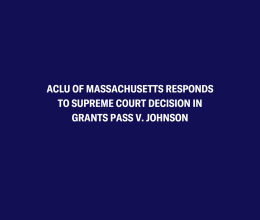
The ACLU of Massachusetts is defending the right to record police officers performing their duties in public. In two briefs filed on July 11, 2018, the ACLU of Massachusetts asks the federal district court of Massachusetts to affirm that it is unconstitutional to enforce Massachusetts’ wiretap law against people who secretly record the police in the public performance of their duties.
The ACLU of Massachusetts filed a lawsuit in June 2016 against the Boston Police Commissioner and Suffolk County District Attorney, defending the right to record police on behalf of two Boston civil rights activists. According to the complaint, the plaintiffs will not secretly record police due to a credible fear of arrest and prosecution under the wiretap statute. While they have often exercised their right to record the police openly, they believe recording secretly would both protect their safety and more accurately document police behavior. Last night’s filing argues that the First Amendment protects their right to do so.
“Time and again, we’ve seen civilians’ videos of police bare the realities of policing in powerful ways,” said Carol Rose, executive director of the ACLU of Massachusetts. “People’s recordings of police interactions have started national conversations about police reform and accountability. We all suffer when fear of retribution or prosecution stifles these conversations and grassroots movements.”
The 1968 Massachusetts wiretap law criminalizes secret audio recordings, and has been used to arrest and prosecute people for secretly recording police officers performing their duties in public. Both the Boston Police Department and the Suffolk County District Attorney’s Office have pursued criminal action under the state law against individuals for secretly recording police officers performing their duties in public. According to the recent filing, neither institution has disavowed such enforcement going forward. This leaves those who are afraid to openly record police officers with no opportunity to exercise their constitutionally protected right. The filing argues that, as applied to the secret recording of police officers performing their duties in public, the state wiretap statute violates the First Amendment.
“The First Amendment protects the right to gather information about police officers,” said Jessie Rossman, staff attorney at the ACLU of Massachusetts. “In order for this right to have real meaning, we must ensure that people can exercise it safely and effectively, without fear of arrest or retaliation.”
In the fall of 2016, Commissioner William Evans and District Attorney Daniel Conley filed a motion to dismiss the lawsuit. A federal judge denied the motion to dismiss, and ruled that the case could move forward. All three parties have now filed motions for summary judgment, or a request for a court decision made on the claims involved without holding a trial.
The ACLU of Massachusetts is set to argue before the U.S. District Court of Massachusetts on Thursday, July 19.
Learn more about the case, Martin v. Evans.







